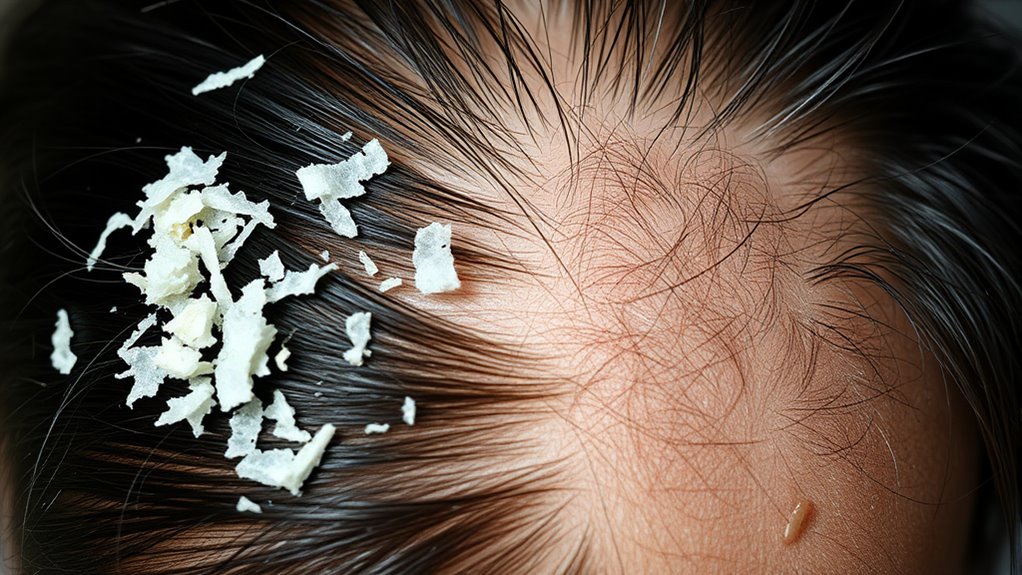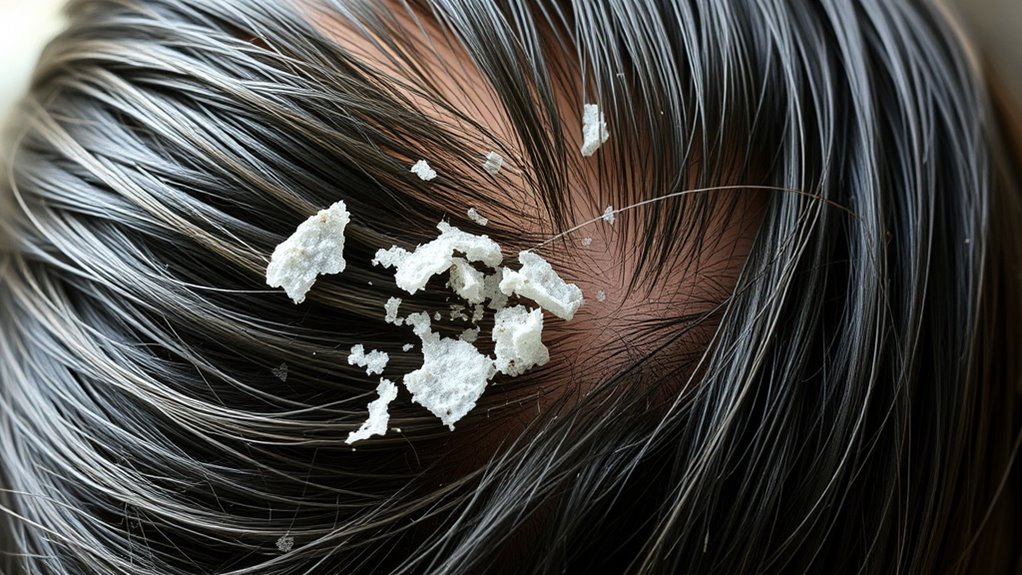To tell if you have dandruff or a dry scalp, look at the flakes—greasy, large flakes usually signal dandruff, often with itchiness, while tiny, dry, powdery flakes suggest a dry scalp. Dandruff is caused by fungi, while dryness results from lack of moisture. Proper treatment depends on identifying the cause, so be cautious with harsh shampoos or over-washing. Keep going to discover how to better care for your scalp and choose the right solutions.
Key Takeaways
- Dandruff flakes are larger, greasy, and often itchy, while dry scalp flakes are smaller, powdery, and less oily.
- Dandruff results from fungal overgrowth, whereas dry scalp is caused by dehydration and lack of moisture.
- Use medicated shampoos with antifungal ingredients for dandruff; hydrate with moisturizing shampoos for dry scalp.
- Over-washing can worsen both conditions; maintain a balanced routine and avoid hot water to prevent irritation.
- Seek professional advice if flakes persist, are oily or dry, or if scalp shows signs of inflammation or persistent itchiness.

Ever wondered what sets dandruff apart from a dry scalp? While they might look similar at first glance, understanding the key differences can help you figure out the right treatment. Dandruff is primarily characterized by flake formation that’s often greasy or oily. These flakes tend to be larger, more noticeable, and sometimes accompanied by an itchy, inflamed scalp. In contrast, a dry scalp usually produces smaller, dry, and white flakes that are more powdery and less oily. Recognizing these subtle differences can help you tailor your scalp hygiene routine effectively.
When it comes to flake formation, your scalp’s condition plays a vital role. Dandruff flakes are typically the result of an overgrowth of yeast-like fungi called Malassezia, which feeds on the oils produced by your scalp. This overgrowth leads to increased cell turnover and the shedding of dead skin in larger, greasy flakes. On the other hand, a dry scalp results from a lack of moisture, which causes the skin to become flaky and irritated. It’s less about excess oil and more about dehydration. This distinction is important because it influences how you should approach scalp hygiene. If you have dandruff, using medicated shampoos containing ingredients like zinc pyrithione, ketoconazole, or selenium sulfide can help control fungal growth and reduce flake formation. Conversely, if your scalp is dry, gentle, moisturizing shampoos that hydrate the skin and restore its natural barrier are your best bet. Avoid harsh cleansers that strip away natural oils, which can worsen dryness.
Your scalp hygiene habits also play a significant role in whether you develop dandruff or a dry scalp. Over-washing can strip natural oils, leading to dryness and irritation, while infrequent washing allows oil buildup that can feed fungi and promote dandruff. Finding a balance is key. Use lukewarm water, as hot water can dry out your scalp further, and always follow up with a conditioner designed for your scalp type. Regularly brushing your hair can also help distribute natural oils evenly, preventing excessive dryness or oil accumulation. If you notice persistent flakes, it’s worth adjusting your routine or consulting a dermatologist. Sometimes, what you think is dandruff may actually be a dry scalp, or vice versa, requiring different treatment strategies. Additionally, maintaining a healthy scalp environment through proper hygiene and balanced care can significantly reduce the likelihood of both conditions.
Frequently Asked Questions
Can Dandruff Cause Hair Loss?
Yes, dandruff can cause hair loss if it leads to scalp infections or persistent itching. When your scalp is inflamed or infected, it can weaken hair follicles, resulting in hair thinning or shedding. If you notice excessive dandruff accompanied by redness or irritation, it’s best to see a dermatologist. Addressing the underlying scalp issues promptly helps prevent further hair loss and promotes healthier hair growth.
Are There Natural Remedies for Dry Scalp?
Think of your scalp as a garden needing gentle care. You can nurture it with natural remedies like herbal oils—tea tree or coconut oil soothe and moisturize. Scalp exfoliation using sugar or oatmeal helps remove buildup and promotes healthy skin. These methods are safe, effective, and restore balance, reducing dryness and flakiness. Regularly applying herbal oils and exfoliating keeps your scalp healthy and your hair looking vibrant.
How Long Does Scalp Treatment Usually Take?
Scalp treatment duration varies depending on your condition, but generally, you should expect treatment timeframes of about 2 to 4 weeks. You might need to apply medicated shampoos or natural remedies consistently for several minutes during each session. For best results, follow the instructions on your chosen treatment and be patient, as improvements can take time. Regular use helps your scalp heal and restores balance effectively.
Can Diet Influence Scalp Health?
Your diet is the foundation of your scalp’s health, like roots anchoring a mighty tree. Nutritional habits can either nourish your scalp or leave it vulnerable to issues. Eating foods rich in omega-3s, vitamins A, E, and zinc boosts scalp health. Watch for food sensitivities that might trigger dryness or flakiness. By choosing nourishing foods, you help your scalp stay resilient, preventing problems before they start.
When Should I See a Dermatologist?
You should see a dermatologist if your scalp shows persistent sensitivity or if hair breakage continues despite using gentle shampoos. If over-the-counter treatments don’t improve your scalp condition or if you notice redness, swelling, or worsening symptoms, it’s time to seek professional advice. A dermatologist can diagnose underlying issues like scalp inflammation or scalp psoriasis, helping you find effective solutions to restore your scalp’s health.
Conclusion
Now that you can tell dandruff from dry scalp, think of your scalp as a garden—each needs its own care to flourish. Dandruff’s flakes are like stubborn weeds, while dry scalp’s tightness feels like brittle branches. Tackle dandruff with anti-dandruff shampoos, and nurture dry scalp with moisture. When you understand these subtle clues, you’re the gardener, tending your scalp’s health, nurturing a vibrant, balanced crown that shines with confidence—your personal masterpiece in the mirror.









